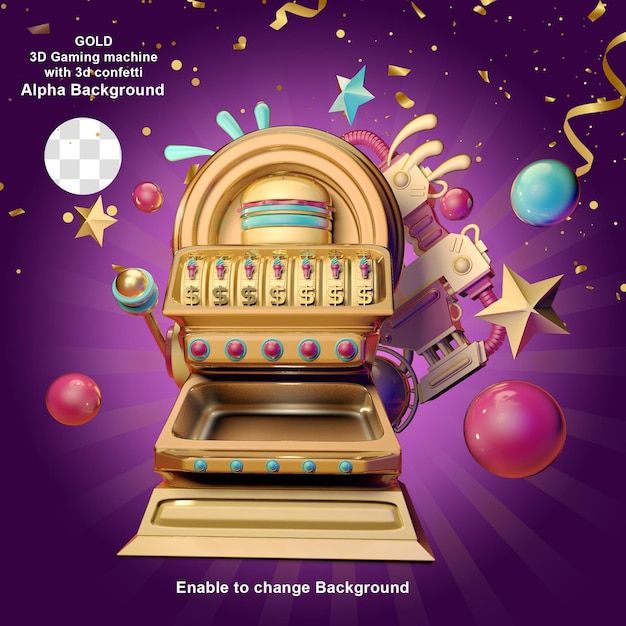Introduction
Slot machines are among the most popular and recognizable games in casinos around the world. Their flashing lights, engaging sounds, and seemingly endless variety of themes captivate millions of players every year. But behind the vibrant façade of spinning reels lies a complex psychological framework designed to keep players engaged and entertained. Understanding the psychology behind slot machines can provide insights into why they are so compelling and how they influence player behavior. This comprehensive guide explores the various psychological factors that contribute to the allure of slot machines, from the mechanics of game design to the behavioral responses of players.
The Mechanics of Slot Machines
How Slot Machines Work
Random Number Generators (RNGs)
- Definition: RNGs are algorithms that generate random numbers to determine the outcome of each spin. This ensures that each spin is independent and unpredictable.
- Function: RNGs ensure fairness and randomness in the game, making it impossible to predict or manipulate the results.
Paylines and Payouts
- Paylines: Lines on which winning combinations must appear. Modern slot machines can have multiple paylines, increasing the chances of winning.
- Payouts: Based on the combination of symbols that appear on the reels. Each combination has a predetermined payout amount.
The Design of Slot Machines
Visual and Audio Stimuli
- Graphics and Themes: Slot machines feature a wide range of themes, from classic fruit symbols to elaborate movie tie-ins. The visual appeal is designed to attract and retain players.
- Sound Effects: The sounds of spinning reels, winning combinations, and celebratory jingles contribute to the sensory experience and reinforce positive emotions.
Bonuses and Features
- Free Spins and Bonuses: Special features, such as free spins and bonus rounds, are designed to provide additional chances to win and keep players engaged.
- Jackpots: Progressive and fixed jackpots create excitement by offering the possibility of large rewards.
The Psychology of Slot Machines
The Concept of Near Misses
Definition and Impact
- Near Misses: Occur when a player comes close to winning but doesn’t quite achieve it (e.g., two symbols followed by a third symbol that fails to align).
- Psychological Effect: Near misses can be motivating and encourage continued play, as they give the illusion of being close to a win.
Research Findings
- Studies: Research has shown that near misses activate the same reward centers in the brain as actual wins, which can lead to increased playtime.
The Role of Variable Rewards
Understanding Variable Reward Schedules
- Definition: Variable reward schedules involve delivering rewards at unpredictable intervals. This is a core principle of slot machine design.
- Impact on Behavior: The unpredictability of rewards keeps players engaged, as they anticipate the possibility of winning at any moment.
Psychological Theories
- Operant Conditioning: B.F. Skinner’s theory suggests that variable rewards are highly effective at reinforcing behavior. The uncertainty of when a reward will come can lead to persistent playing.
- Gambling Fallacy: The belief that a win is “due” can drive players to continue playing, even if there is no actual change in probability.

The Illusion of Control
Perception of Skill
- Skill-Based Features: Some modern slot machines incorporate elements that appear skill-based, such as mini-games or interactive features.
- Illusion of Control: Players may believe that their actions can influence the outcome, even though the results are determined by RNGs. This illusion can lead to increased engagement and longer play sessions.
Cognitive Biases
- Gamblers’ Fallacy: The erroneous belief that past events affect future outcomes. For instance, a player may believe that a slot machine is “due” for a win after a series of losses.
- Overconfidence: Players may overestimate their ability to influence the game or predict outcomes, leading to continued play.
The Social and Environmental Influences
Casino Environment
Design and Ambience
- Atmosphere: Casinos are designed to create an immersive and stimulating environment. The absence of clocks, the use of bright colors, and the arrangement of machines are all intended to keep players engaged.
- Social Interaction: The presence of other players, staff, and the overall excitement of the casino can contribute to the enjoyment and prolongation of play.
Marketing Strategies
- Promotions and Loyalty Programs: Casinos often use promotions, bonuses, and loyalty programs to encourage repeat play and increase player retention.
- Free Drinks and Perks: Offering free drinks and other perks can create a sense of value and enhance the overall gaming experience.
Social Influence and Peer Pressure
Group Dynamics
- Social Proof: Seeing others play and win can encourage individuals to try their luck. The social aspect of gambling can influence behavior and increase participation.
- Peer Pressure: Friends or acquaintances who gamble can also influence individuals to engage in slot machine play.
Responsible Gambling and Player Awareness
Identifying Problem Gambling
Signs of Addiction
- Behavioral Changes: Increased time spent playing, financial problems, and neglecting responsibilities are potential signs of gambling addiction.
- Emotional Impact: Feelings of anxiety, frustration, or depression related to gambling can indicate problematic behavior.
Seeking Help
- Support Resources: Various organizations and resources are available to help individuals struggling with gambling addiction, including counseling services and support groups.
- Self-Exclusion Programs: Many casinos offer self-exclusion programs that allow individuals to restrict their access to gambling activities.
Strategies for Responsible Play
Setting Limits
- Budgeting: Establishing a budget and sticking to it helps prevent overspending and ensures that gambling remains a form of entertainment.
- Time Management: Limiting the amount of time spent playing can help maintain a healthy balance and reduce the risk of addiction.
Awareness and Education
- Understanding Odds: Educating oneself about the odds and probabilities of slot machines can help set realistic expectations and make informed decisions.
- Recognizing Triggers: Identifying personal triggers and avoiding situations that may lead to excessive gambling can contribute to responsible play.
FAQs
How do slot machines ensure fairness?
Slot machines use Random Number Generators (RNGs) to determine the outcome of each spin, ensuring that each result is independent and random. This technology provides fairness and unpredictability in the game.
What is a near miss in slot machines?
A near miss occurs when a player comes close to winning but does not achieve it, such as having two matching symbols and a third symbol that fails to align. Near misses can create the illusion of being close to a win and encourage continued play.
Why are slot machines so addictive?
Slot machines are designed with various psychological elements, such as near misses, variable rewards, and the illusion of control, which can lead to increased engagement and potentially addictive behavior. The combination of sensory stimulation, unpredictable rewards, and social influences contributes to their appeal.
How can I play slot machines responsibly?
To play responsibly, set a budget and stick to it, manage your time spent playing, and be aware of the odds and probabilities of the game. Recognize signs of problem gambling and seek help if needed. Many casinos also offer self-exclusion programs and resources for responsible gaming.
What should I do if I think I have a gambling problem?
If you suspect you have a gambling problem, seek help from support resources such as counseling services, support groups, and gambling helplines. Many organizations offer assistance and guidance for individuals struggling with gambling addiction.
Conclusion
Slot machines are a fascinating blend of entertainment and psychology, designed to captivate players through sensory stimulation, engaging features, and psychological principles. By understanding the mechanics, psychological influences, and responsible gambling strategies, players can make informed decisions and enjoy slot machines as a form of entertainment. Whether you’re a casual player or an avid gambler, being aware of the underlying psychological factors can enhance your gaming experience and promote responsible play.
Embrace the thrill of the game while keeping your awareness sharp and your approach balanced. Enjoy the excitement of spinning the reels with the knowledge that understanding the psychology behind slot machines can lead to a more informed and enjoyable gaming experience.
Furthermore, the intermittent reinforcement schedule used in slot machines plays a crucial role in addiction. This type of reinforcement, where rewards are unpredictable and random, is known to be highly addictive. 8kbet Players are conditioned to expect a potential reward with each spin, leading to a continuous cycle of anticipation and reinforcement that can be difficult to break.
